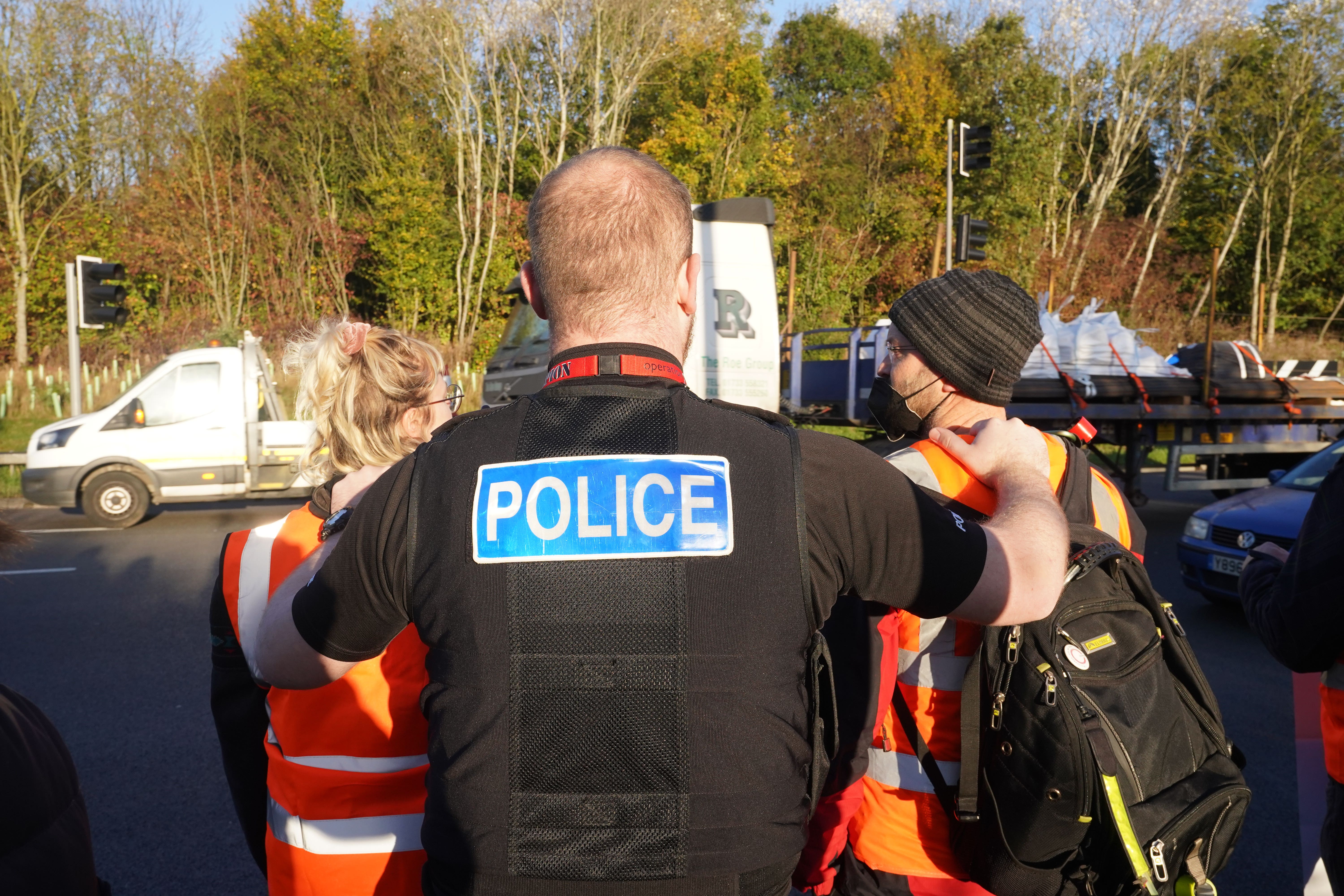Sunak pledges more police powers to tackle ‘completely unacceptable’ protests
Suella Braverman and policing minister Chris Philp met with police chiefs to discuss tackling the ‘guerrilla tactics’ used by Just Stop Oil.

Rishi Sunak pledged that police will have whatever powers required to crack down on disruptive protests, following a meeting with police chiefs in Downing Street.
The Prime Minister called it “completely unacceptable” that ordinary people were having their lives disrupted by environmental protests.
Police chiefs said they had a “constructive” meeting with Home Secretary Suella Braverman and policing minister Chris Philp to discuss tackling the “guerrilla tactics” used by Just Stop Oil protest groups.
It is completely unacceptable that ordinary members of the public are having their lives disrupted by a selfish minority
Mr Sunak, who joined the start of the roundtable hosted in No 10 on Thursday, said: “This afternoon I sat down with all the police chiefs to make it clear that they have my full support in acting decisively to clamp down on illegal protests.
“It is completely unacceptable that ordinary members of the public are having their lives disrupted by a selfish minority.
“My view is that those who break the law should feel the full force of it, and that’s what I am determined to deliver.”
Police chiefs issued a statement following the talks in Downing Street, describing the meeting as “constructive”.
Chief Constable BJ Harrington, the National Police Chiefs’ Council lead for public order and public safety, said it showed a “joint commitment to tackling criminal activism while respecting lawful protest”.
“We are not anti-protest, but we are anti-crime. Police are committed to responding quickly and effectively to activists who deliberately disrupt people’s lives through dangerous, reckless, and criminal acts.
Mr Harrington, the head of Essex Police, said forces were “fully prepared to deal with further disruption planned ahead of Christmas”.
Earlier Metropolitan Police Commissioner Sir Mark Rowley suggested efforts by officers are having an effect and said he is “absolutely determined” that anything that goes beyond lawful, reasonable protest will be “dealt with robustly”.
But he also admitted that some trials may not take place for two years amid delays in the criminal justice system.
Mr Sunak, asked if ministers will bring in new legislation or boost powers for officers, said: “We are currently giving the police new powers so that they can clamp down on these illegal protests.
“They will have my full support in acting decisively and rapidly to end the misery and the disruption that’s being caused to ordinary families up and down the country.
“I’ve said to the police whatever they need from Government they will have in terms of new powers.”
I’m absolutely determined that anything that goes beyond lawful reasonable protest by creating serious disruption to London, by creating damage to property, will be dealt with robustly
Mr Harrington, speaking to the PA news agency after the meeting, said Ms Braverman had praised the work of the police.
He said the Home Secretary shares their concerns and “shares our ambition to make we’re as effective as we can be”.
“She’s respected our operational independence, which is an important part of British policing. But she is there to help us to make sure we get the balance right, to make sure we’ve got the right powers, which I think we have,” he said.
He added that police chiefs used the meeting to request that Parliament and the Government be clear on the legal definition of “serious disruption”.
But he also acknowledged concerns about delays and backlogs in the court process, saying: “Any delay in the court system is justice delayed, whether that’s for the victim or the suspect.”
Earlier the Met Commissioner told the London Assembly that Just Stop Oil had got “much less assertive in their recent protests”.
“Frankly, as a consequence of a large number of their leaders being remanded in custody as a result of our operations,” he said.
“I’m absolutely determined that anything that goes beyond lawful reasonable protest by creating serious disruption to London, by creating damage to property, will be dealt with robustly,” he added.
“That’s why we’ve used the more serious offences such as the statutory offence of public nuisance – we put the best part of 60 offenders before the courts at one stage for that offence.”
Sir Mark said most of the trials for members of the environmental activist group are scheduled to take place in 2024 due to delays in the criminal justice system.
Earlier this week, Just Stop Oil protester Jan Goodey, who caused “mile after mile” of tailbacks on the M25 after climbing up a gantry, was jailed for six months after admitting causing a public nuisance.
The 57-year-old was part of a demonstration on behalf of the climate group which forced authorities to close sections of the UK’s busiest motorway during the morning rush-hour on November 7.
In September, Goodey, from Brighton, East Sussex, had been handed a two-year conditional discharge for obstructing the highway in a separate protest last year.
District Judge Daniel Benjamin said he had “flagrantly ignored” previous warnings that his conduct “was not acceptable in a peaceful and democratic society”.
Bookmark popover
Removed from bookmarks